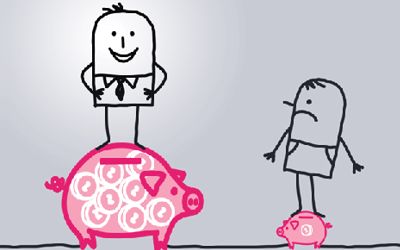As if the global disillusionment with the status quo of governments and politics isn’t bad enough already, the recent release of files detailing Panamanian tax shelters that can be linked to 72 current or former heads of government has only made it worse.
Economic inequality is exerting a growing influence on shaping the global political debate. The 2011 Occupy Wall St movement carried the slogan “we are the 99%”, then in 2014 a 700 page economics book by Thomas Piketty with the catchy title of “Capital in the Twenty-First Century”, which asserted that the unequal distribution of wealth causes social and economic instability, saw him become a temporary global figure.
And now we’re at the point that someone as evidently unqualified and unsuitable as Donald Trump is a real possibility to run for President of the United States, possibly against a self-described socialist in Bernie Sanders, in a country where Obamacare was broadly derided as the ‘socialization of medicine’. Across Europe nationalist parties are gaining in popularity and traction on political platforms that only 10 years ago would have been the purview of fringe dwellers.
Since the GFC central banks the world over have plunged into highly experimental monetary policy. Economic growth has resumed, albeit at a much slower pace, but it has been trending slowly upwards. The problem is there are a lot of people who just don’t feel that things have improved for them all that much, especially in Europe and the U.S. We keep reading about the lion’s share of economic rewards going to the top 1% of earners. So what’s going on?
Economic data tends to be reported in terms of averages, so we’re used to seeing ‘average weekly earnings’, or ‘GDP per capita’. The problem is sometimes the average isn’t the most representative number to look at. The good folks at BCA Research in Canada expressed it well: imagine there are 100 people in a pub in the western suburbs of Melbourne or Sydney and then Bill Gates walks in. The average income of all those in the bar has probably just shot up past $1,000,000 a year, but the median income will still be a long way below that. Obviously the median is a better representation of the crowd in the pub.
Likewise, when you look at average earnings across a whole economy it is being skewed by the disproportionate share going to the top 1%. Looking at the median income tells a very different story, as shown by the two charts below.

The massive monetary policy stimulus since the GFC has succeeded in increasing GDP and unemployment in places like the U.S. has fallen dramatically. However, a lot of the jobs created have been low paying service jobs, like fast food and hospitality, which only serves to extend the long tail of median-type jobs. The bulk of the benefits are going to those who own assets whose prices are rising because of so much liquidity, whether that’s companies or investors.
If politicians had been collectively brave enough to use fiscal policy instead the charts would look a lot different, because unlike the blunt instrument of monetary policy which is all about influencing people to borrow and spend and drawing forward tomorrow’s consumption to today, fiscal policy can be very specific in taking from one group and giving to another. But fiscal policy is about the distribution of government revenues, which are by and large raised through taxes and no government has yet been brave enough to have that conversation.
The consequences are now coming through: a groundswell of unrest, coming from the growing group of people that form the median, that aims to shake up the status quo. Perhaps it’s history not repeating but rhyming: episodes of great economic inequality have almost always resulted in social unrest. In the years to come it will be fascinating to see how historians look back on this period.





